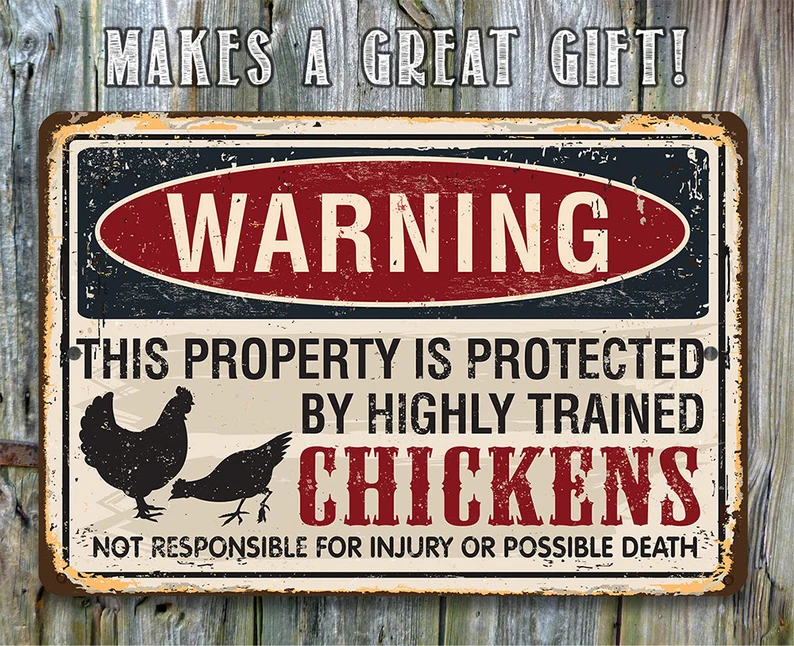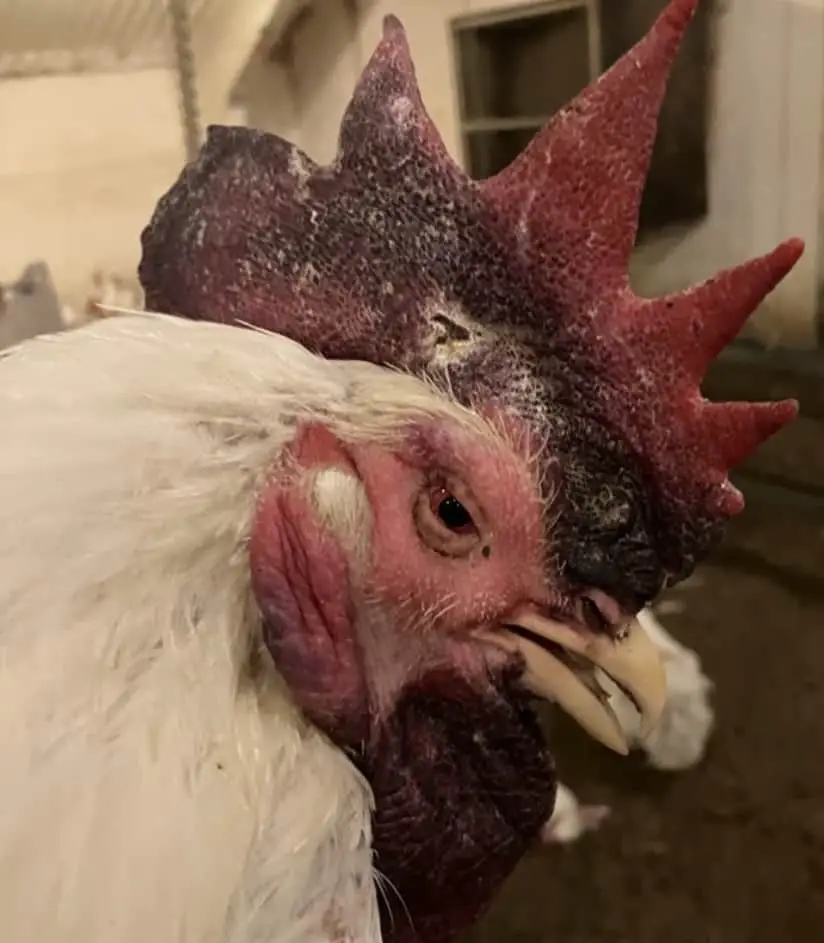Recently I discovered one of our girls had a couple of black spots on the chicken comb, so I called up our vet once again and get some reason I will bring to you in this article. Black spots aren’t a disease in chickens I learned. Rather, it is a symptom that your chicken is suffering from severe health issues. Being a chicken keeper, my primary duty is to keep my birds healthy. I check them every day to ensure they look active and comfortable. One of the best things about a chicken that I love most is the comb. It’s an important part of their body. And, is an indicator of your chicken’s health condition.
Key Takeaways
- Black spots on a chicken’s comb are not a disease but a symptom of underlying health issues.
- Common reasons for black spots on a chicken’s comb include Fowl Cholera, Fowl Pox, Avian Influenza, poor health condition, and frostbite.
- Observing and investigating the black spots can help identify the specific cause.
- Consultation with a veterinarian is crucial for proper diagnosis and treatment.
- Maintaining the overall health of chickens, protecting them from contagious diseases, and seeking timely veterinary care is essential for preventing and addressing black spots on the comb.
Sometimes, I do notice black spots on the chicken’s comb. Most of the time, people assume that it is a disease. In reality, this isn’t a disease. Black spots on the comb of the rooster are the symptoms of certain diseases in chickens. In this post, you get to know the reasons for chicken comb black spots.
| Reason | Description | How to Investigate |
|---|---|---|
| Fowl Cholera | Carefully examine the chicken’s comb for black spots and lesions. Observe the bird’s overall health and behaviour. Veterinary consultation is crucial for confirmation and appropriate management. | Observe the affected chicken closely, looking for characteristic symptoms. Consult with a veterinarian for a proper diagnosis and treatment plan. |
| Fowl Pox | Viral disease with dry and wet forms, characterized by black spots, lesions, breathing difficulties, and plaques in the mouth. Prevention through vaccination and separating infected birds is recommended. | Monitor the chicken’s overall health, including appetite, behaviour, and energy levels. Consult with a poultry specialist or veterinarian for a comprehensive examination and diagnostic tests. |
| Avian Influenza | Contagious viral infection with symptoms such as respiratory problems, face swelling, and black comb. Consult a veterinarian if suspected. | Observe the chicken for respiratory issues, swelling, and black spots on the comb. Isolate any sick birds and seek immediate veterinary attention for proper diagnosis and guidance. |
| Poor Health Condition | Check for signs of frostbite, such as discolouration and tissue damage on the comb. Provide appropriate care, including protecting the chicken from cold temperatures, and consult a veterinarian for further evaluation and treatment. | The blackening of the comb can indicate poor health due to issues like poor blood circulation, liver problems, or heart disease. Consult a poultry specialist for proper diagnosis and treatment. |
| Frostbite | Assess the chicken’s overall health and behaviour, noting any abnormal signs. Veterinary examination, including blood tests and imaging, may be necessary to investigate liver health accurately. | Severe frostbite can lead to a black or purplish comb due to frozen fluid inside the cells. Seek medical advice from a veterinarian to nurse affected chickens back to health. |
| Liver Problems | Liver dysfunction in chickens can contribute to comb discolouration or blackening. Symptoms may include reduced appetite, weight loss, lethargy, and abnormal behaviours. Consult a veterinarian for a comprehensive evaluation. | Observe the chicken for signs of heart disease, including comb discolouration, lethargy, and respiratory distress. Consult a veterinarian for a thorough examination, which may involve listening to the heart and conducting diagnostic tests. |
| Heart Disease | Cardiovascular conditions may impact blood circulation, leading to comb color changes. Chickens with heart disease may exhibit weakness, difficulty breathing, exercise intolerance, and fluid accumulation. Veterinary examination and diagnostic tests are necessary for accurate diagnosis. | Cardiovascular conditions may impact blood circulation, leading to comb colour changes. Chickens with heart disease may exhibit weakness, difficulty breathing, exercise intolerance, and fluid accumulation. Veterinary examination and diagnostic tests are necessary for accurate diagnosis. |
Reasons for black spots in chicken’s comb
As said, if you notice black spots on the comb, it indicates that your chicken is suffering from a disease. The reasons are many our vet told me. And, the best way to investigate the matter is to observe them. That way, you can locate the exact reason for the black spots.
So, here are the reasons why the chicken’s comb has black spots.
1. Fowl Cholera
Considered a highly contagious disease, Fowl Cholera is identified by the purple spots on the chicken’s comb. The symptoms include oral discharge, coughing, diarrhoea, and swollen joints. Other symptoms might include fever, wattle swelling, and loss of appetite.
Sometimes, it can even lead to the death of the chicken.
Cats and swine carry the bacteria causing Fowl Cholera. While big hens and pullets are at risk, the bacteria can cause harm to chickens of any age. Antibiotics such as tetracycline and penicillin are effective against the disease. Also, vaccination can prevent the disease from happening.
Despite precautions and medications, the bacteria can return. That’s because it can stay in the soil for a long time. Using disinfectants can give good results. But you have to keep your poultry away for a few weeks. The bacteria may return when you introduce new birds.
2. Fowl Pox
It is another viral disease common in birds and chickens as well. Fowl Pox spreads slowly and you can identify it by the black spots on the comb. Fowl Pox has two different variants: dry and wet forms. In the dry form, you will notice small lesions on your chicken’s skin leading to black scabs.
In the wet form of Fowl Pox, you will notice breathing difficulties in your chicken. Moreover, you may find plaques in the mouth and upper respiratory tract of the chicken. Preventing chickens from this virus is challenging.
They get infected through respiratory transfer and skin abrasions. Also, the disease spreads when chickens ingest scabs from the infected ones. Birds and insects such as mosquitoes carry the viruses.
The slow-moving nature of the virus means that you have to deal with Fowl Pox for a few months. There is no exact treatment for Fowl Pox as of now. To prevent this disease from occurring, vaccination and replacing the chickens out of the flock is the only way.
3. Avian Influenza
It is another contagious viral infection in chickens that devastated the poultry industry in the past. However, Avian Influenza rarely affects backyard chickens. But it is something that you need to be aware of. To identify whether your chickens are suffering from this viral infection, look out for the black spots on the comb.
The symptoms of the strong impact of this deadly disease include respiratory problems, dehydration, face swelling, wattles, and black comb. Sometimes, the infected chickens will lay shell-less or soft eggs and discharge blood through the nostrils.
If you believe that your chicken is suffering from Avian Influenza or notice black spots on the comb of the rooster, call in your vet immediately.
Ad: I thought you’d like these…


Medical reasons for black spots
4. Liver Problems
Liver issues in chickens can manifest in various ways and may impact the colour and condition of the comb. Liver dysfunction can affect the bird’s overall health and result in changes to the comb, including discolouration or blackening.
Symptoms may include reduced appetite, weight loss, lethargy, and abnormal behaviours. Diagnostic tests, such as blood work and imaging, may be necessary to evaluate liver function accurately.
5. Heart Disease
Heart problems can also contribute to black spots on a chicken’s comb. Cardiovascular conditions may affect blood circulation, leading to poor oxygenation and subsequent changes in comb colour. In addition to black spots, chickens with heart disease may exhibit signs such as weakness, difficulty breathing, exercise intolerance, and fluid accumulation in the body.
Veterinary examination, including listening to the heart and diagnostic tests like radiographs or ultrasound, can help assess the heart’s condition.
You also need to know…
Essentials
Other reasons for black spots on the comb
The above-mentioned diseases were the common reasons for chicken comb black spots. Apart from that, other health issues can result in black combs.
6. Poor health condition
The right way to make sure your chickens are in good health is to watch out for the colour of their comb. If a chicken is in poor health, the comb will discolour and shrivel up. This situation arises because of poor blood circulation due to certain reasons.
And, the comb fails to display a vibrant rose or red colour. There might be legitimate reasons why the comb becomes black. So, it is wise to check out your chickens with a specialist in the poultry industry. I know several cases where chickens were either suffering from liver or heart problems.
When the liver gets damaged, the chicken’s body shuts down after some time. Moreover, if the chicken has heart disease, the first symptom comes in the form of black spots on the comb. So, whenever you notice a black comb, consult with a vet as soon as possible.
7. Frostbite
If you notice your chicken’s comb turning black or purplish, it means they have suffered severe frostbite. It occurs when the fluid inside the cells of the comb freezes. The tips are where it affects most.
You need to protect your flock and nurse them until they return to full health. However, it is difficult to comment on individual birds. To remain on the safer side, it is wise to seek proper medical advice from an experienced vet.
At this point, I’m sure you need the free Chicken Disease Cheat Sheet
…
Chicken comb turning black is a symptom and not a disease
People assume that their chicken might be suffering from a certain disease when they observe black spots on the comb. Black spots aren’t a disease in chickens. Rather, it is a symptom that your chicken is suffering from severe health issues.
So, whenever you notice a black comb, visit a good vet for better treatment. Keep in mind that any kind of disease in chickens is curable if you take preventive measures at the right time.
Conclusion
So, you can tell more about your chicken’s health by looking at its comb. And, there is no need to panic if you find black spots on their comb. All you need to do is to consult a vet and treat the disease at the earliest.


